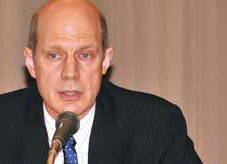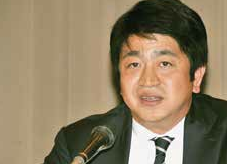Issue:
Ex-Diet member Takatane Kiuchi and research analyst Michael Cucek are pessimistic about the emergence of a legitimate opposition to Japan’s present administration


Takatane Kiuchi can relate to the LDP’s envious position today; he knows what it means to gain power in a landslide victory. The former banker for Mitsubishi UFG and Merrill Lynch was elected to the Lower House in 2009 on a strong DPJ ticket. Unfortunately, like many of his colleagues, Kiuchi lost his seat in December 2012 and, since then, he’s had to watch the performance of Prime Minister Shinzo Abe and his party from the sidelines.
Though he likes Abenomics in principle, he misses an alternative to the powerful prime minister and has come to a simple conclusion. “All the opposition parties should come together to face the LDP,” he said. “They need to offer an alternative to Abe and his party.”
Michael Thomas Cucek, research analyst at the MIT center for political studies and author of the highly esteemed political blog, Shisaku, agreed that no major unified opposition force exists. There is one obstacle. “Abe covers everything,” he said. “There is no space next to him.” Cucek finds support for his thesis when looking at the polls: “When you ask people why they support Abe, the most frequent answer is: there is nobody else.”
Kiuchi and Cucek made their remarks at the Club in late April during a new event called the Political Roundtable. About 20 participants sat down with the two experts to discuss the topic of “Reviving the Moderate Center in Japanese Politics.” The format differs from press conferences and professional lunches in that it is intended to be a discussion between the participants and the invited guests rather than a strict Q&A format. By taking a step back from the fast-paced day-to-day politics, the political roundtables are intended to look at larger tendencies and underlying currents, and the seating arrangement around a big table is meant to be more conducive to a discussion between equals.
However, despite the fact that journalists, academics and representatives from the diplomatic community a representative sample of the Club’s membership were present at the first roundtable, the discussion mainly focused on comments from Cucek and Kiuchi about the possibility of the re-emergence of a strong opposition to the LDP.
The one-and-a-half years since Abe’s return to power have shown that this is easier talked about than done. Despite a lot of talk and political haggling, in particular before both the Lower House election in December 2012 and the Upper House election in July 2013, the concept of “center” implies that there is something to the left and to the right. Both Cucek and Kiuchi agreed, however, that there is no political left in Japan worth speaking of anymore. Abe’s economic policies, in particular, leave little room for anything else. Whereas elsewhere conservative policy makers would call for a balanced budget, cuts in expenses and fiscal discipline, Abenomics is all about stimulating both by spending huge amounts on construction projects and ultra-loose monetary policy. As Cucek stated: “Abe’s program does not fit any conservative label we can put on.” This has made it practically impossible for other parties to speak out against measures that are supposedly implemented to create jobs and raise salaries.
Cucek argued that Abe’s program is all about saving the system. He cited, as an example, Abe’s lobbying for opening the labor market for more immigrants when more inclusive immigration policies are anathema to conservative nationalistic politicians elsewhere. But Abe knows that he has no other choice if he wants the reconstruction in Tohoku to continue and the buildings for the 2020 Olympics to be ready in time. Kiuchi fully supported Abe’s call for more immigrants, as he sees no alternative, a reaction that clearly shows the dilemma for the people who want to present an alternative world to Abe’s Japan. Kiuchi also related his experiences working with Morihiro Hosokawa during the recent Tokyo gubernatorial elections in an attempt to present an alternative to the LDP-backed Yoichi Masuzoe when he found little room to create space, policy-wise, next to the wide aims of the prime minister.
Is Japan, therefore, stuck with Abe? Both Cucek and Kiuchi expect the present prime minister to be around for some time. Still, no politician lasts forever, and Kiuchi points to a possible danger for the prime minister if people get disenfranchised when the so-called third arrow of structural reforms does not deliver, when salaries stagnate and taxes go up. Still, he said with resignation, it is unlikely that this will lead to the revitalization of the political center: “People will get unhappy and when people are unhappy, they tend to lean to the right.” Cucek seconds this belief that the status quo will not easily change. “Older people tend to be more conservative and Japan has a lot of elderly people,” he said. “However, the young in this country are conservative too. They will not bring change and the women will not bring it either.”

The Political Roundtable event is organized monthly, and is open to Members only (non-members are invited to participate once but are encouraged to join the Club after that). Please check the website for the upcoming schedule.
Patrick Zoll is the political correspondent for the Swiss daily Neue Zurcher Zeitung. He covers Japan, the Korean peninsula and Taiwan from his Tokyo base.

